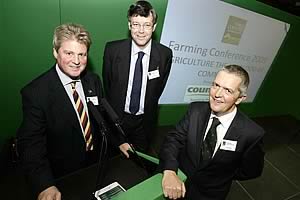 |
|||||||||
|
|||||||||||||||||||
|
|
Farmers Advised to Take the Tractor to the Playground British farmers must demonstrate that they are producing wholesome food, maintaining a world-beating regard for animal welfare and looking after the countryside – and even take the tractor to the playground, if they are to gain the trust of the non-farming public, raise the profile of agriculture and succeed in business.
That was the view put forward by award-winning Essex farmer Guy Smith, who was speaking to 200 delegates at the Three Counties Agricultural Society’s annual Farming Conference: ‘Agriculture, The Lifeblood of Community’, on 19 November. Mr. Smith, who is Chairman of the NFU’s Regional Board, and the author of the Food, Farm and Countryside booklet, told the audience: “Food, animal welfare and the environment are all topics which interest the British public, and therefore they are all topics which excite controversy. If the British public can trust farmers in these matters, then there will be less regulation. To succeed in business we must produce efficiently, but the way forward is not just about production and farmers must campaign properly and effectively. We must explain what is not self-evident to the general public, and tell them what we are doing on our farms. We must monitor what’s going on our own land, so that if our methods have a negative impact on biodiversity, we can change it, and we must accept that if the public don’t know about the provenance of food it is not their fault, and take steps to correct it with education. We need to get our message across and get smart to the virtual world of the web. We are latecomers to the virtual world and we need to get our foot on the throttle!” Also speaking at the Malvern conference was livestock farmer John Geldard, creator of the famous Plumgarths Hub, Farm Shop, Food Service and Lakelands Food Park and recipient of the ASDA Award for Supply Chain Excellence for its Local Sourcing Initiative. Mr. Geldard’s work with the supermarket chain began with him putting 80 products from around 18 suppliers into one ASDA store, but has grown to 250 products in 18 ASDA stores nationwide, and the evolution of 9 ASDA hubs. His farming enterprise has diversified over the years, to include the establishment of a profitable egg production unit in response to public demand for free-range eggs, and a sausage and burger plant. Like Guy, John emphasized the need for farmers to drive British produce to the consumers in a way they want to acknowledge. He said: “Consumer interest in local produce is now high. Local is the brand most in demand over and above organic and regional and more and more people are shopping for food and eating at home. We must recognize what people want, where they go to get it, and how as farmers we can tap into that.” Both speakers addressed the importance of education in raising the profile of agriculture nationwide, agreeing that children are the future consumers. Guy, who organizes the highly successful and popular Essex Schools Day, said: “At story book level, animals are often seen walking around in happy gangs, and the only threat is man! We must be careful what we put into the minds of children. If they see farmers as irresponsible, unkind, dirty and cruel, then we will have the mother of all marketing problems when they grow up! They will vote for more legislation which will drive costs up and export agriculture from these shores. It is good for farmers to meet children from non-rural areas, because it helps to break down social barriers that don’t need to be there. There are some logistical issues with having children on farms, such as CRB checks, e-coli and insurance, but we should not let these John said that young people could still get into farming, and that there were many opportunities for them, but that farmers must attract them with the right message, conveyed by the right person. “It is no good sending a farmer who is struggling to earn a crust because of a failing enterprise. We need to send the farmer who has a profitable enterprise.” This year’s conference was chaired by Lord Apsley of Cirencester - Governor of the Royal Agricultural College, and Three Counties Agricultural Society President in 2008. In his opening address, Lord Apsley said it was worrying how little even our rural communities knew about farming. He suggested that post 1950’s industrialized agriculture for maximum food output had left the public with an image of agriculture as subsidized vandalism of the countryside, with farmers taking out hedgerows and spraying the land. He added that agriculture had certainly become more marketing orientated, and that the farmer had suddenly been required to deal with the public, posing the question that if pre-1950’s agriculture had been the lifeblood of community, was community not now the lifeblood of agriculture? Lord Apsley concluded that if farmers were to be successful they would need to drive forward better education of children, their parents and other adults, regain public trust, establish what the environment is worth, agree on what is local and what is not, and ensure that marketing and branding were very high on the agenda.
|
||||||||||||||||||

|
|
||||||||||||||||||
| home | agri-services | pedigree
pen | news | dairy | beef | machinery BPS | property | organisations | site map |
|||||||||||||||||||



